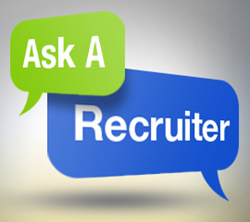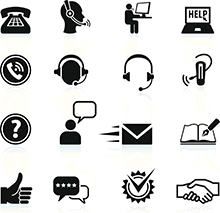 Navigating the job search, acing interviews, and creating resumes can be challenging. We know there’s a lot to learn about these processes, and we want to help you by answering your questions. Our very own industry experts at Express Employment Professionals are posting their recruitment and hiring answers right here on the Movin’ On Up blog.
Navigating the job search, acing interviews, and creating resumes can be challenging. We know there’s a lot to learn about these processes, and we want to help you by answering your questions. Our very own industry experts at Express Employment Professionals are posting their recruitment and hiring answers right here on the Movin’ On Up blog.
Question:
In the second installment of our new series, “Ask a Recruiter,” we’re excited to feature a question from Movin’ On Up reader Anthony.
Anthony asks, “What do you do if you were terminated from a job and when you ask for a reference, the manager says they can’t give you a reference, only a phone number to call for verification of employment?”
Answer:
In an ideal situation, your previous employer would provide your potential employer with all the details needed for you to land your next dream job. However, most companies don’t offer specific details about previous employees – regardless of whether you left the company after termination, down-sizing, or by choice.
Employers do this to protect both their company and you. If an employer is called to provide information about a previous employee, they must be careful to provide factual and well-documented information. To avoid claims of defamation and to restrict giving out any confidential or protected information, many companies have strict policies in place about providing references for past employees. Some companies will only share basic information, like the length of employment or positions held.
Keep in mind that when an inquiry call is made about a previous employee, some companies send these calls straight to the Human Resources department. From there, only your dates of employment along with other small details are released.
I’m betting your previous manager doesn’t have a choice but to direct people to HR to handle referrals. Instead of listing your manager as a reference, I would consider asking a previous co-worker to be a referral. If you worked together at the same company, they can talk about your work ethic and what it was like to work alongside you.
Since the information shared from company to company varies, it’s generally unknown what a potential employer may be able to learn through a reference. Play it safe by choosing references who can easily speak about your experience and skills as they relate to your job performance. These people may include previous teachers, co-workers, or mentors. And remember to ask for permission from anyone you list as a reference so they are prepared for calls from your potential employers.
Thanks for asking, Anthony! And thank you to Blake Whisenant from Express for providing the answer!
Do you have a question about the job search, hiring, or recruiting process? Now’s your chance to have your question answered by industry professionals who find, interview, and hire people every day. Ask your question in the comments section below and check back soon to read what our experts have to say!
Check out previous installments in the “Ask a Recruiter” series:
Movin’ On Up is brought to you by Express Employment Professionals.






